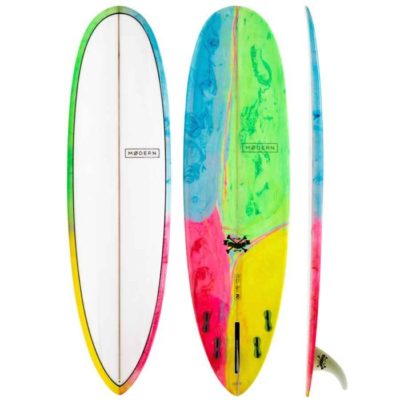Description
THE DON NR Noserider ACT
BEST OF BOTH WORLDS
The Don Nose Rider is a mix of our all round performance Don model with a more traditional Noserider. Up front is a wide nose, low entry rocker and teardrop concave – a sure fire combination for stability and tip time. But unlike a traditional noserider with soft rolled rails and vee bottom, the Don NR combines a hard rail and double concave vee in the tail of a more modern longboard.
ACT PRE-PREG
Torq ACT surfboards are the world’s first EPS/Epoxy Pre-Preg surfboards. The technological advantages are immense, but the most significant advantage is 100% controlled process with ZERO surplus resin.
On any surfboard the resin’s function is to hold the fibre in place. It offers little structural integrity of its own, little flex and little impact strength. As a material without the fibre it is heavy and brittle. Any surplus resin is dead weight – resisting flex, adding weight.
With Pre-Preg process the perfect amount of resin is added to the cloth by machine, before the shaped blank is laid up – zero surplus, zero dead weight.
WHAT IS PRE-PREG?
Pre-Preg means the glass fibre weave is pre-impregnated with resin and hardener (kept cold to prevent curing). The fibre resin material is called a Pre-Preg matrix which is cured under high pressure and high temperature in a fully controlled environment.
This ‘baking process’ results in the strongest form of laminate.
THE RESULT
Greatest strength to weight ratio. Typically, strong boards are heavy and light boards are weak (or stron and light boards are very expensive). Torq ACT boards have a super strong 6oz+4oz lay up on deck and bottom with an extra 6oz deck patch but they weigh around the same as a light glassed PU board.
Most importantly, they respond better. The feel of these boards is like no other surfboard – they are incredibly responsive. The unhindered flex and zero dead weight means all of the energy that you put through your feet is delivered into the turn with none of the ‘deadening’ effect from the resin.
FLEX / RE-FLEX
The idea of flex in surfboard performance is really only half of the picture. Flex is easy to achieve and represents the loss of energy rather than the return of it. The important aspect of flex is re-flex; the ability of a material to return to its shape; releasing the energy stored when flexed.








